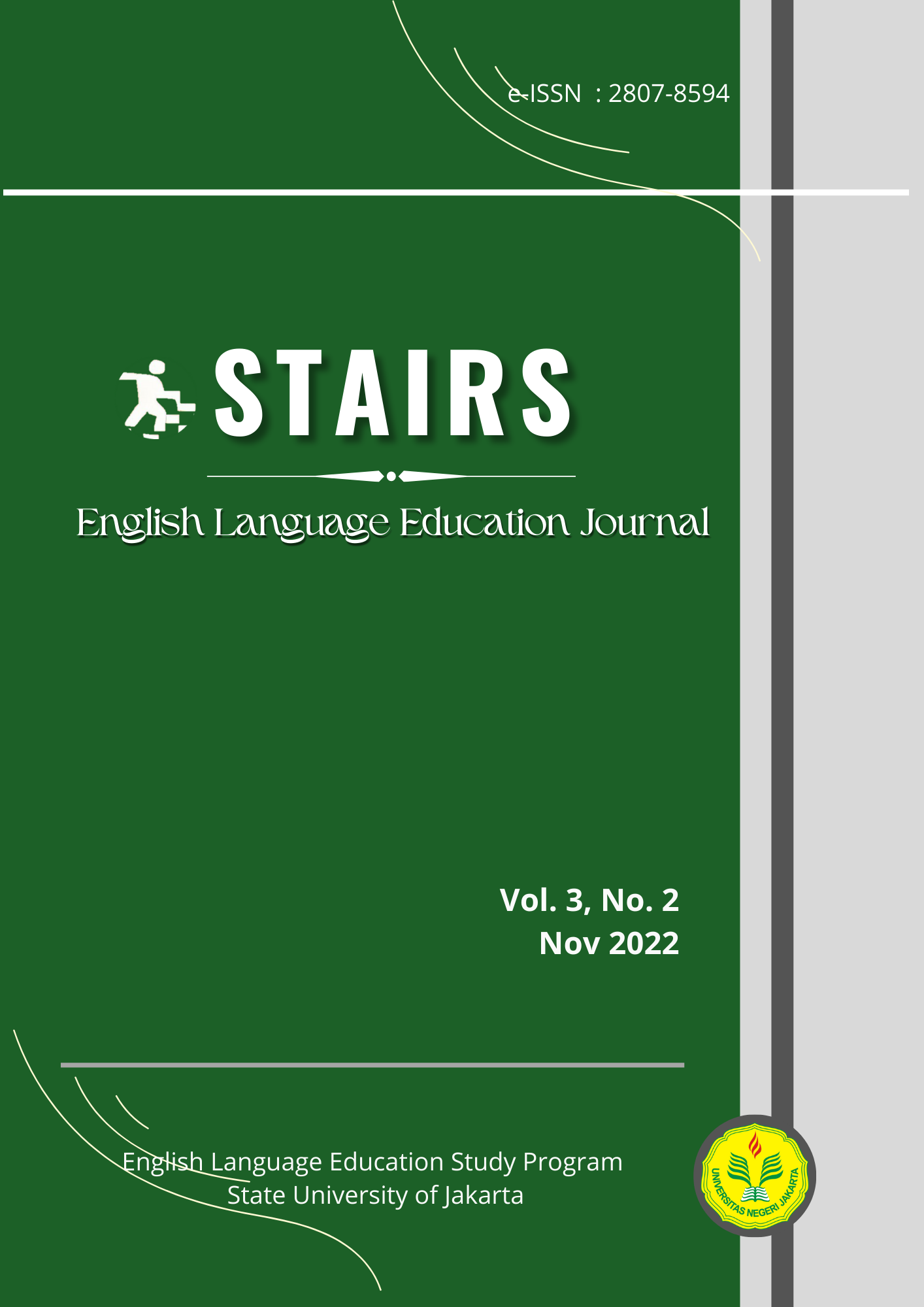Exploring Secondary-school EFL Teachers’ Perception and Practices of Formative Assessment
DOI:
https://doi.org/10.21009/stairs.3.2.7Keywords:
Formative Assessment, Language Assessment Literacy, Teachers’ Perception, Teacher’s Assessment PracticesAbstract
Formative assessment is critical to effective classroom instruction and is widely acknowledged as a positive ‘facilitator’ of student learning and its careful implementation has powerful, positive effects on learning. This implies requirements for teachers to have an appropriate level of language assessment literacy or LAL since the effectiveness of teachers’ practices is much influenced by their perceptions or beliefs and related experiences. This study aims at obtaining better insights into English Foreign Language (EFL) teachers’ perceptions and practices of formative assessment. For this purpose, ninety-two EFL teachers of General and Vocational Secondary Schools in Jakarta and Bogor areas were involved as subjects of the study. The findings of the study reveal that teachers may not fully comprehend what FA is. This is reflected in the significant inconsistencies in their responses to the given questionnaires and interviews that suggest a misconception of FA. More rigorous study with better methodology is recommended as follow-up actions. In addition, the findings generate an urgent call for EFL teacher education programs to devise relevant professional development programs that can meet the actual needs of preset and inset program participants.
References
Berry, V., Sheehan, S., & Munro, S. (2017). Exploring Teachers’ Language Assessment Literacy: A Social Constructivist Approach to Understanding Effective Practices. ALTE 6th International Conference ¬ Learning and Assessment: Making the Connections, 3-¬5 May 2017. Bologna, Italy. Retrieved from http://eprints.hud.ac.uk/id/eprint/33342/
Black, P., & Wiliam, D. (1998). Assessment and Classroom Learning. Assessment in Education: Principles, Policy & Practice, 5(1), 7-74. doi:http://dx.doi.org/10.1080/0969595980050102
Chapuis, J., Stiggins, R., Chapuis, S., & Arter, J. (2014). Pearson New International Edition: Classroom Assessment for Student Learning. Upper Saddle River, NJ: Pearson Education Limited.
Creswell, J. W., & Clark, V. L. (2018). Designing and Conducting Mixed Methods Research (3rd ed.). Thousand Oaks, CA: SAGE Publications, Inc.
Heritage, H. M. (2007). Formative Assessment: What Do Teachers Need to Know and Do. Phi Delta Kappan, 89(2), 140-145. Retrieved from https://kappanonline.org/formative-assessment-heritage/
Heritage, H. M. (2010). Formative Assessment: Making It Happen in the Classroom. Thousand Oaks, CA: Corwin.
McMillan, J. H. (2016). Section Discussion: Student Perceptions of Assessment. Dalam G. T. Brown, & L. R. Harris (Ed.), Handbook of Human and Social Conditions in Assessment (pp. 221-243). New York, NY: Routledge.
McMillan, J. H. (2018). Classroom Assessment Principles and Practice that Enhance Student Learning and Motivation (7th ed.). New York, NY: Pearson.
MOEC. (2016). Ministerial Regulation No. 23. Assessment Standards. Jakarta: MOEC.
MOEC. (2018, April 26). Ministerial Regulation No. 36 of 2018. Amendment to Ministerial Decree No. 59 of 2014 on the 2013 Curriculum of SMA/MA. Jakarta: MOEC. Retrieved from https://jdih.kemdikbud.go.id/sjdih/siperpu/dokumen/salinan/Permendikbud%20Nom
MOECRT. (2022, April 26). Ministerial Decree No. 21. Educational Standards of Early Childhood, Primary, and Secondary Education. Jakarta: MOECRT. Retrieved from https://jdih.kemdikbud.go.id/sjdih/siperpu/dokumen/salinan/salinan_20220523_140932_SALINAN_Permendikbudristek%20No_21%20Tahun%202022_%20Standar%20Penilaian%20Pendidikan%20(jdih.kemdikbud.go.id).pdf
MoNDP/NDP Agency. (2019). National Medium-Term Development Plan 2020-2025. Appendix 1. Jakarta: MoNDP/NDP Agency.
Popham, W. J. (2017). Classroom Assessment: What Teachers Need to Know (8th ed.). New York, NY: Pearson Education, Inc.
Stiggins, R., & DuFour, R. (2009, May). Maximizing the Power of Formative Assessments. Phi Delta Kappan, 90(9), 640-644. Retrieved from https://citeseerx.ist.psu.edu/document?repid=rep1&type=pdf&doi=e801912bdbc0639045d40527aa738254a81d27e3
Suskie, L. (2018). Assessing Student Learning: A Common Sense Guide (3rd ed.). San Fransisco, CA: John Wiley & Sons.
Yan, Z., Lia, Z., Panadero, E., Yanga, M., Yanga, L., & Lao, a. H. (2021). A Systematic Review on Factors Influencing Teachers’ Intentions and Implementations regarding Formative Assessment. Assessment in Education: Principles, Policy & Practice, 28(3), 228–260. doi:10.1080/0969594X.2021.1884042



